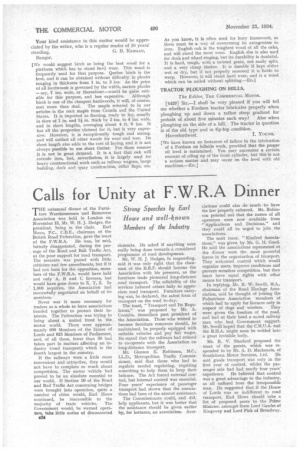Calls for Unity at F.W.R.A Dinner
Page 38

If you've noticed an error in this article please click here to report it so we can fix it.
Strong Speeches by Earl Howe and well-known Members of the Industry
THE autumnal dinner of the Furniture Warehousemen and Removers Association was held in London on November 15, Mr. W. H. J. Hedges, the president, being in the chair. Earl Howe, P.C., C.B.E., chairman of the British Road Federation, gave the toast of the F.W.R.A. He was, he said, bitterly disappointed, during the passage of the Road and Rail Traffic Act, at the poor support for road transport. The measure was passed with little criticism and few amendments, but if it had not been for the opposition, members of the F.W.R.A. would have held not only A. B and C licences, but would have gone down to X, Y, Z. In 1,000 inquiries, the Association had successfully negotiated on behalf of its members.
Never was it more necessary for traders as a whole to have associations bonded together to protect their interests. The Federation was trying to bring about u united front in the motor world. There were approximately 600 Members of the House of Lords and 615 Members of Parliament, and, of all these, fewer than 50 had taken part in matters affecting an industry (road transport) which is the fourth largest in the country.
If the railways were a little more convenient and attractive, they would not have to complain so much about competition. The motor vehicle had proved to be an absolute essential to our world. If Section 30 of the Road and Rail Traffic Act concerning bridges were brought into operation, quite a number of cities would, Earl Howe continued, be inaccessible to the majority of trade vehicles. The Government would, he warned operators, take little notice of disconnected
B24
elements. He asked if anything were really being done towards a considered programme of road development Mr. W. H. J. Hedges, in responding, said it was only right that the chairman of the B.R.F. should honour the Association with his presence, as the furniture trade pioneered long-distance road transport. The reliability of the services induced others fully to appreciate road transport Furniture carrying was, he declared, the safest form of transport on the road to-day.
The toast, "Transport and Its Regulators," was proposed by Mr. A. Coombe, immediate past president of the Association. Those who wished to become furniture removers should, he maintained, be properly equipped with suitable vehicles and pay fair wages. He stated that the railways had refused to co-operate with the Association on long-distance transport.
Mr. Gleeson E. Robinson, M.G., LL.D., Metropolitan Traffic Commissioner, said that those who had to regulate needed regulating, requiring something to help them to keep their balance. The Act forced external control, but internal control was essential. Four years' experience of passenger transport had shown that the associations had been of the utmost assistance.
The Commissioners could, and did, help applicants, but it was better that the assistance should be given earlier by, for instance, an association. Asso
ciations could also do much .to. have the law properly enforced. Mr. Robinson pointed out that the names of all operators were now available from "Applications and Decisions," and they could all be urged to join the associations.
The next toast, "Kindred Associations," was given by Mr. G. H. Good. He said the associations represented at the dinner were the most powerful forces in the organization of transport. They welcomed control which would organize users, improve conditions and prevent senseless competition, but they must have equal rights with other means for transport.
In replying, Mr. R. W. Sewill, M.A., chairman of the Road Haulage Association, said he thought of joining the Pedestrians Association members of which had to apply for licences only in respect of dogs and wireless. They were given the freedom of the road, and had at their head a noted railway man who had Government support. Mr. Sewill hoped that the C.M.U.A. and the R.H.A. might soon be welded into a great invisible body.
Mr. R. V. Stanford proposed the toast of the guests, which was responded to by Mr. A. D. Mackenzie, of Southdown Motor Services, Ltd. He said goods transport was only in the first year of control, whilst the passenger side had had nearly four years' experience. He believed that control was a great advantage to the industry, as all suffered from the irresponsible man. He suggested that if the House of Lords was so indifferent to road transport, Earl Howe should take a list of proposed peers to the Prime Minister, amongst them Lord Garcke of Kingsway and Lord Pick of Broadway.




























































































